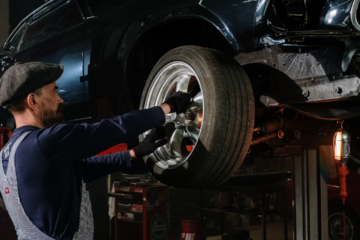How A Fuel Pump Works

Fuel pumps are not rocket science, but they are tricky. The pump is a common piece of technology and has been around since the early days of internal combustion engines. In this post, we will discuss how a fuel pump works, something that is important when considering the purchase of a new vehicle.
If you’re in the market for a new car, you probably have a lot of questions about the process of buying one. You may have a set of criteria that you’d like to have met, or you may have a simple budget in mind. Whatever the case, you’ve got a lot of decisions to make. One question that everyone seems to have is, “how does a fuel pump work?” You may have heard of fuel injection, but to understand how it works, you must first understand the fuel pump.
It’s a common scene in many lives: you’re driving somewhere and notice your fuel gauge is empty. You stop at a gas station and fill up your tank, eager to get back on the road. But then, a few minutes later, you notice the needle has dropped again. What’s going on? Fuel pumps are located in the car’s, truck’s, or motorcycle’s fuel tank to pump gasoline or diesel fuel coming from the tank to its supply line (often a hose) that feeds the engine.
Fuel pumps are devices used to refuel vehicles. These are typically small, self-contained, Hydraulic Parts that are controlled by a computer. The computer monitors trends and patterns in the vehicle’s fuel consumption and uses algorithms to adjust the fuel pump output accordingly.
This device drives the fuel injectors that feed the engine with fuel. It is basically a small mechanical device that pumps liquid fuel into the fuel rail and then through an injector (you may wish to look at injectors for 6.7 cummins as an instance) in the cylinder. Fuel pumps are designed to work within the given pressure range. They can withstand high pressure due to the design of fuel injectors combined with the lubrication system that helps the fuel pump lubricate itself. Therefore, fuel pumps should be chosen based on the performance requirements of the fuel system.
An important part of the car’s operation is the fuel pump. The fuel pump is used to pump fuel from the car’s tank to the tank of the engine. It is also the main source of fuel for the car’s other systems. An old saying goes, “A man is to his tools as his tools are to him.” The saying is partially true, but a lot of the truth lies in the tools used. For example, a tool used to saw wood can also be used to make a pair of boxers. It can help make a turn signal light, or it could be used to put a hole in one’s head.
Fuel pumps are a crucial part of your car’s fuel system. They deliver fuel from your gas tank to your engine, and it’s these pumps that allow you to fill up those big jugs of gas at the corner gas station every week. If your car’s fuel pump goes out, you can become stranded, and if it happens at a time when you need a car for work or any other reason, you could be in a pretty bad situation. The one thing that all vehicles have in common is the fuel pump. It is the heart of the engine and pumps fuel throughout the entire car. To ensure optimal performance and durability, high-quality components like Viton Gaskets are often used in fuel pumps to provide a reliable seal, resist chemical damage, and handle extreme temperatures. When a car owner purchases a new car, it’s important to understand at least the basics of how the fuel pump works.
When it comes to vehicles, we all want to get the most out of them. This is especially true when it comes to cars, as it is easy to put more money into an older vehicle than you would have liked. However, a few things can go wrong with a car before you know it-especially if you don’t take care of it. Fuel pumps are one of the most important parts of your car’s engine. As they ensure that the fuel is delivered to the engine, they also ensure that all the fuel is pumped into the engine’s combustion chamber so that it can be burned.
However, the problem with fuel pumps is that they can fail in a variety of different ways. If your fuel pump fails, you may experience a number of common symptoms, such as a check engine light, a lack of power, and a “check engine” sound from the exhaust.



0 Comments